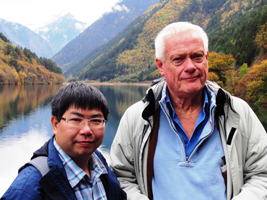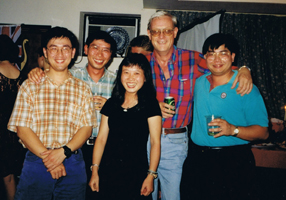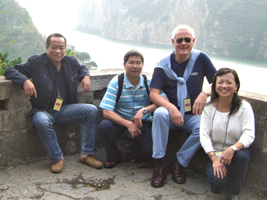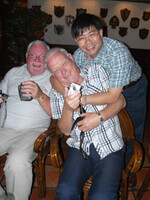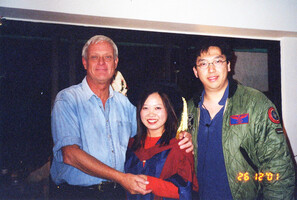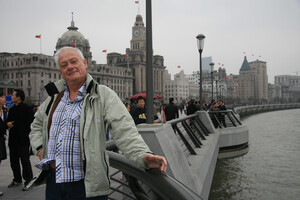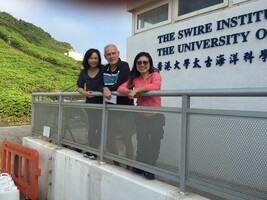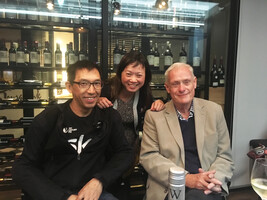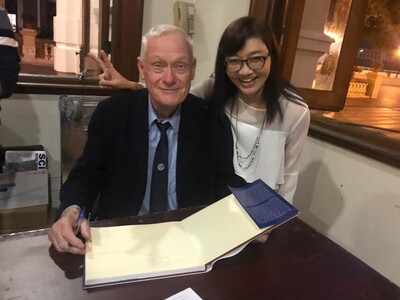“Thank you for leading me to the wonderland of marine biology, and your inspiration did change my life. I am very proud to be your first student, and you set an excellent role model for the Morton’s clan to follow. You will stay in our hearts forever. Vale Brian!” — Professor Rudolf WU |
Dear Brian, my best friend,
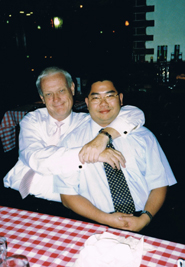 I have been thinking of you from time to time since you passed away. I am sure you knew very well that you were the person who had the most significant influence on me, starting right from the time when you took me up as your higher degree student some 35 years ago. Not only had you trained me to be a good marine biologist but also taught me how to be a better and stronger person with clear vision, mission and values. You always encouraged me to speak my mind and persevere in what I believe is right. Your guidance and inspiration have benefitted me for the entire life. I hope that I have made you proud of what I have become. I have been thinking of you from time to time since you passed away. I am sure you knew very well that you were the person who had the most significant influence on me, starting right from the time when you took me up as your higher degree student some 35 years ago. Not only had you trained me to be a good marine biologist but also taught me how to be a better and stronger person with clear vision, mission and values. You always encouraged me to speak my mind and persevere in what I believe is right. Your guidance and inspiration have benefitted me for the entire life. I hope that I have made you proud of what I have become.
Being your close friend, I felt very privileged to share and enjoy lots of good and wonderful times with you as well as having the opportunity to support each other especially during difficult times. We had many fond memories, be they scientific achievements or adventurous holiday trips we made together. I really wish that you were still here with me so that we would be able to do more things together.
Thank you very much, Brian, for all the things you did and everything you taught me. Your big heart, strong passion, great charisma, signature laughter and good sense of humour as well as all the happy days and good memories we shared together will continue to stay in my mind for the years to come. You will be in my heart, always and forever!
While thinking of you over a glass of your favourite Chablis, my thoughts are also with your family and loved ones!
Love El Fai
— Dr S F LEUNG |
“Farewell Brian, our beloved ‘See Fu’. Thanks for being a lifelong teacher and friend. You taught me that anything can be achieved if you believe it's important enough and you showed us how it's done by your life's work. As I navigate through myriad of challenges in my life, you never judged my decisions and you're always there with good advice, full support and enlightening humour. You are gone yet always here.” — Dr Vivian LAM |
“I am so happy to be your youngest student. Brian, you are one of the most generous and kind-hearted people I had ever known. You went over and beyond, blessing us with the wealth of your knowledge and your unpretentiousness and genuine respect. By taking the time to write Christmas card for everyone of us, and in many big and little ways, you showed us your care, which we will never forget. Now that I have to accept that I will not be receiving Christmas cards from you anymore, but every Christmas card from you that I keep will remind me of the lovely memories. I miss you very much, Brian.” — Dr Emma MAK |
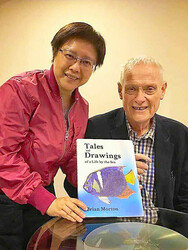 “Professor Brian Morton是我生命中最尊敬的教授之一,他對學術研究的嚴謹態度,他為香港海洋生態保育所作出的無私奉獻,還有他待學生如子女一樣的關懷備至,成為我等後輩良好的典範。恩師如今雖已遠赴天國,我深信他仍然心繫香港,時刻關顧曾經和他一起為環境保育共同努力的盟友。Professor Morton, 您的身教言傳,我將銘記於心。” “Professor Brian Morton是我生命中最尊敬的教授之一,他對學術研究的嚴謹態度,他為香港海洋生態保育所作出的無私奉獻,還有他待學生如子女一樣的關懷備至,成為我等後輩良好的典範。恩師如今雖已遠赴天國,我深信他仍然心繫香港,時刻關顧曾經和他一起為環境保育共同努力的盟友。Professor Morton, 您的身教言傳,我將銘記於心。” — Dr Winnie Shuk Ming TANG Remembrance articles of Professor Brian Morton by Dr Winnie Tang: 《悼香港海洋生態保育之父》,信報財經 “In memory of father of marine ecological conservation in HK”, EJ Insight
|
— Dr Khaki CHAN
|
On Brian Brian had a dry sense of humour, which I learnt about when he was at SWIMS, the marine institute he established with “Morton’s Way”. I just regret I didn’t seize all the opportunities to learn about the ocean from him. Instead we ran into each other at the bar in the Senior Common Room, over a beer and the sunset. Then whenever he was back at HKU, we would have a big, warm hug.
A few years ago I visited him in Little Hampton. Such peace! We were emailing a lot too, when he would tell some of the funniest stories including that of a pen. Again, I would have loved to know more about life under the water and his life in particular – only this time it would be from his books and drawings, mapped to his passionate voice.
Brian, thank you for your love of Hong Kong and HKU.
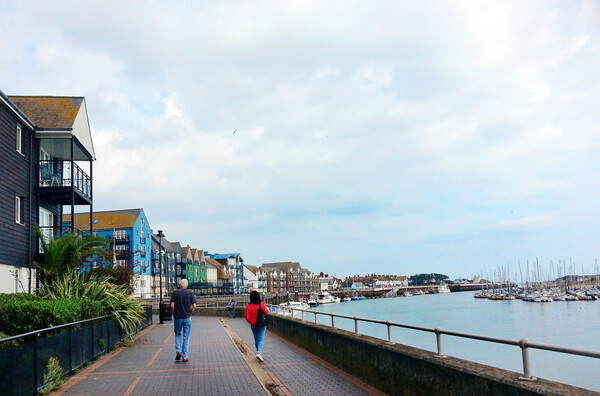 Little Hampton, July 2017 Hello again… Well, I'd like to come to HK later in the year or early next, but I increasingly think it is unlikely, despite the attraction of having dinner with you. Keep safe and well Bernadette. love brian (June, 2020) Hello again Bernadette, I was only joking with you. G-d knows, we need a little humour at this time. Thank you for the advice regarding the painting.
… Just before I left HK, the then dean came to my office and 'presented' me with a gift. Unwrapping it, I saw that it contained a ballpoint pen with the HKU logo on it and, un-noticed by him, also with a price tag of $HK15 on its box's back.
… But, I'm not dead yet and, so far, surviving the virus (11 weeks in strict isolation so far). Plus, Kevin McKeown and I are hoping that we can jointly celebrate our 50 years of first coming to HK and HKU in the SCR, possibly in September but if not then later - providing of course that I am still fit enough to fly by then.
Fifthly and finally Bernadette, as always, it is lovely to talk with you and to, especially, obtain your advice. Let's keep in touch and I really do appreciate you thinking of me. I think of you too. You keep safe and well and let us hope we can meet up again in 2020 but if not in 2021. Love Brian (May, 2020) — By Bernadette TSUI, Associate Vice-President, The University of Hong Kong 2021.6.15 |
“Egrets …. I’ve seen a few”: remembering Brian Morton It is a depressing and difficult task to write about Brian. Depressing for all the obvious reasons. Difficult because he accomplished so much that any sort of precis is bound to miss a lot. Difficult, too, because he was a complex man, not easily summed up in a few paragraphs – or even pages. This reminiscence is inevitably highly selective.
First the straightforward stuff. Brian was – unarguably – the most important marine biologist to have worked in Hong Kong and at Hong Kong University; I add that phrase because he was proud of the association and, after all, he did spend his entire career with the institution after joining in 1969. It is solely because of Brian’s energy and drive that the Swire Group of Companies was willing to partner with HKU to establish the Swire Institute of Marine Sciences in 1989. It has been a great success. SWIMS is now going through its second renovation and expansion, and supports a vibrant, international group of graduate students and research scientists. Of course, Brian trained many of his own graduate students before and after establishment of SWIMS, some of whom went on to hold influential positions in government departments charged with looking after Hong Kong’s environment, or in education; others have contributed to society in a variety of ways. Brian was a passionate teacher of undergraduates, and was effective in that role because he genuinely loved what he was doing and wanted to convey that ardor to the next generation of scientists and citizens. Brian also made used of his many international connections and his location in Hong Kong to run a series of international workshops – some focusing on marine ecology, others on malacology (= the study of molluscs) – where scientists lived and worked together for a couple of weeks contributing work that increased our knowledge of local biodiversity. The best of these were held at Wu Kwai Sha in the years before it became part of Ma On Shan New Town and gained its own MTR station. They featured extensive field work, intricate procedures carried out in makeshift temporary laboratories established for the workshops. The long days were followed by much late night discussion and carousing fueled by San Miguel beer thereby forging many long-term collaborations and friendships. Marvelous times, indeed. And then there was Brian’s own scientific output. There was certainly a great deal of it, reflecting the inordinate amount of energy that he always seemed able to conjure up (despite the aforementioned carousing and, for many years, his prodigious consumption of Winston cigarettes). What was perhaps Brian’s most important single contribution appeared relatively early, and was published by HKU Press in 1983. Soon after arriving in Hong Kong, Brian realized that there was no accessible literature on local inshore marine life. To remedy this, he coauthored (with New Zealander John Morton – no relation) a book entitled The Seashore Ecology of Hong Kong. It was a handbook that any interested student or layperson could use to find her way around the coasts of Hong Kong, while learning about their natural history and fauna. It was illustrated by many line drawings of the animals and their habitats (which Brian provided himself), and almost 40 years later is still the go-to reference for our shores. In the interim, some of the names of the creatures featured in the book have changed – taxonomist are wont to adjust and tinker with Latin binomials, and higher rankings such as genera and families tend to shift a bit - but none of this was Brian’s fault, and the book is still remarkably useful. One thing it does reveal is the extent to which communities on particular shores have changed over the years. For instance, the description of Hoi Sing Wan (Starfish Bay) incudes sketches of many creatures that cannot be found there today – most notably, the starfish. If he had accomplished nothing else (although there was much more to come), The Seashore Ecology of Hong Kong secured Brian’s place as the founding father of marine biology in the territory. During his years here, he devastation people wrought upon the Hong Kong environment were not lost on Brian, and he was a fierce critic of those – including government – who attempted to conceal or disregard them. During the 1980s, denial of pollution and environmental degradation was certainly the default mode of the local authorities, and Brian would frequently call them out for it. During one memorable occasion local on TV, Brian railed about the untreated “… pig shit …” flowing into Tolo Harbour - to the evident alarm (it might have been glee) of the show’s presenter. His concern for local conservation led Brian to the local chapter of WWF, which was just getting started in the early 1980s. He became chairman of their education committee charged with increasing awareness of the environment in local schools. That was a big ask at the time: children had little exposure to or interest in nature (even most of those studying biology at HKU were doing so only because they had failed to be admitted to medical school), and the local environment was not mentioned in school science curricula. I believe Brian took on this important task because he realized that effective protection of nature and the environment had to begin with awareness and education. That seems obvious now, but it was not so then, and Brian deserves credit for perceiving and building upon the connection. Later he was instrumental in the establishment of WWF’s Hoi Ha Wan Marine Life Centre. As WWF (HK) approaches its 40th anniversary, and has grown from an organization that had only a single staff member to one with a complement of over 120, it is important to acknowledge that Brian played an important role in its development. A small part of Brian’s role in the WWF story involved the annual Big Bird Race in which teams would rush around Hong Kong and the New Territories for 24 hours trying to spot as many species of birds as they could in order to raise sponsorship money. For a few years, Brian and I were part of a team called the Birdbrains (Brian was Captain) and, one year (I think it was around 1985), he came up with the notion that we should compose a team song about our bird-spotting experiences and perform it for all the other race participants at the after-party. A fragment of the lyrics is included in the title of this reminiscence. (Hint: think of Mr Sinatra singing ‘My Way’-“… then again, too few to mention”.) Going back to his research, Brian often described himself as a marine biologist, sometimes as an ecologist, and occasionally as a malacologist. None of these entirely hit the mark. He was something of a generalist, but was, at heart, a zoologist and his interest in marine biology and ecology was primarily driven by trying to understand what the animals were doing in their habitat – in other words, how they fed, moved, and made a living. His core scientific work concerned the functional morphology of bivalves (oysters, clams, and the like); his basic approach was to take them to bits to see how they worked. Mostly this involved opening the shell and examining the soft parts using a range of techniques. But Brian’s great skill was to translate the rather amorphous internal anatomy of bivalves into intricate 3-D drawings of how the parts worked together and contributed to a functioning animal. He used the drawing process as a way of seeing or understanding the creature. I doubt there was anyone else working with bivalves who had Brian’s depth of understanding and grasp of the biology of these animals. It is a pity that he never trained a graduate student in functional morphology or left a successor; perhaps he felt there were too many pressing topics deserving of study in the seas around Hong Kong. I have already referred to Brian’s energy, but I need to say a little more about him as a person. He could be immensely kind and generous, and was always fiercely loyal to his graduate students, but was occasionally capable of extreme belligerence – sometimes, although certainly by no means always, directed at those he regarded (up until then) as friends. Often this bellicosity passed without any lingering animosity, but that wasn’t always the case and Brian could be his own worst enemy. He would seldom take a moderate position in an argument if he could adopt a more extreme view. Plus he was not at all ‘woke’, and wouldn’t have recognized the need even if it had been pointed out to him. (Woe betide anyone who might try!) And because he had worked hard to get to where he was, Brian took a rather dim view of people who (he felt) were undeserving of their rank or station. He wasn’t always right about that: Brian did not remain a fan of those who hired him to join HKU or smoothed his path to becoming a professor, but they certainly did the right thing in recruiting him and facilitating his advancement. Hong Kong, the university and its students, as well as marine science are richer for it. Brian was a larger-than-life character who could be a little brash at times. He seemed totally bulletproof, and those who knew him tended to underestimate his insecurities. But he could be very sensitive to things he imagined undermined his position, or underplayed the importance of SWIMS and his own role in maintaining it. Because Brian achieved so much, and with apparent ease, it was easy to take his robustness for granted. Friends and colleagues occasionally failed to take sufficient account of insecurities that – in certain situations – could give rise to a ferocious response. It is probably fair to say that, sometimes, we let him down. We shouldn’t have missed it: after all, Brian was a Barry Manilow fan – how hard core could he really be? All things must pass. But given his legacy, Brian will not be forgotten. — David DUDGEON 18 June 2021 |
Dearest Brian,
l will always miss you being there whether it's for a catchup call, or a cup of tea or with a glass of wine in your hand telling me about your latest holiday or showing me your latest drawing or treasure you found. Thank you for looking after me at HKU and back here in the UK. I will always treasure our time together and the places you got me invited to. It was an honour to have had you as my boss, as a mentor for my MSc, as a mentor for life and a true friend. Sorry l never made it to Littlehampton last year despite your invite. This is a lesson learnt from Covid 'Just go do it!' after speaking with Lily Tong at the funeral. The sound of your voice will never me.
Much love and always the 'Good girl', Manna X
To the Morton family, thank you for remembering me when a space became available at the service. It meant a lot. X — Manna WAN |
— Dr Ivan K K Chan, Marine Parks Officer, AFCD |
— Alan Chan, Senior Marine Parks Officer, AFCD |
Salute to Professor Morton! My beloved Ci Fu (師傅)
Dear Brian,
I was so lucky to meet you in one of the many scientific conferences you organized. You invited me to work at the Swire Institute of Marine Science (SWIMS) as one of your Ph.D. students. Frankly, I’m still very honored to be a one of your Ph.D. students. You taught me a lot, had done so many things for me that I’ll never be able to repay and forever changed my life. Thank you Brian, for everything you've done for me! 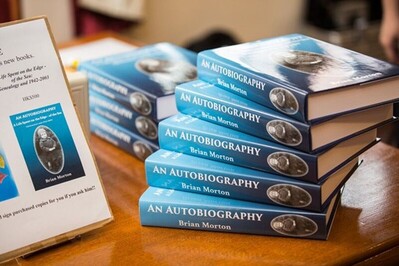 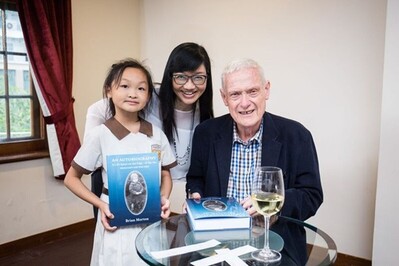 Cheers! Professor Morton. My beloved Ci Fu (師傅). You will be dearly missed. 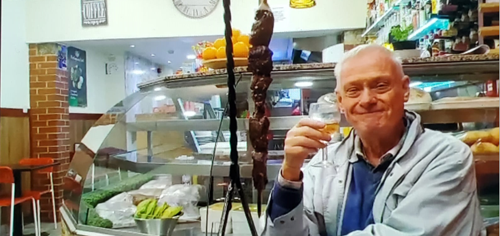 From: Dr. Alice Lai-Chun CHAN 2021 June 24 — Dr Alice Lai-Chun CHAN |
When I first worked as your Secretary in 1997, we shortly became good friends. You are the one I respect much like a father. I am honour that we have accompanied each other for some 24 years. Not to mention your great contribution to your postgraduate students, to the marine conservation in Hong Kong, your legacy will nourish many generations in future. I believe that you are enjoying your life in the other world, you may be telling jokes happily with Prince Philip...... Thank you for being my lifelong friend. The memories of you and your laughers will be in my heart forever. Love, Sylvie
  
— Sylvie |
Dear Brian, my buddy, There is no goodbye! You forever live in my memory – the trips we made, the good times we had, and the knowledge you transferred to me. In the end, if I have impacted the world, made it somewhat a better place, made it last longer, like you have done, I would be happy with my life. Not wasting the resources that one has consumed is in itself an awesome achievement! You have done well for our species. You should be proud. Although I cannot physically be present at your celebration of life gathering in HKU, I will be there in spirit. See you down the road! Love, Albert — Albert |
Dearest Brian, I still remember the night, some 36 years ago, when I first met you, sat nearby you, talked about dreams, and shared peanuts. To me, it seems like yesterday. At that time, I was just a first year undergraduate. I am very proud to call you my Si-fu. Deep in my heart, you mean much more than that. Thank you for giving me all the opportunities, courage and trust. Without you, I would not be what I am. I miss you. CHIU King-tung, Tony 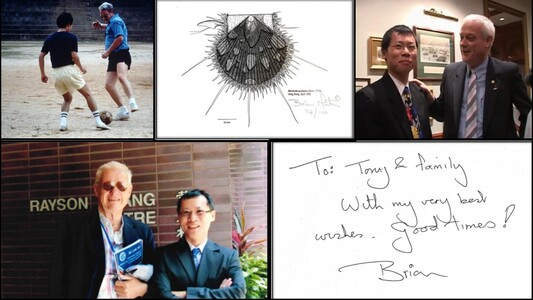 — CHIU King-tung, Tony |
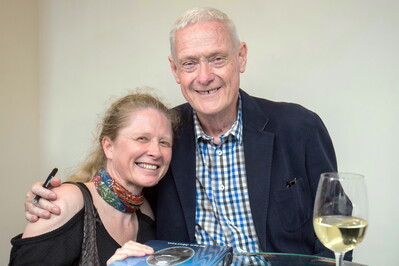 I first spoke to Brian over the phone. I was in Scotland and he in Hong Kong, but even over this somewhat two-dimensional communication system, the force of his personality blasted through! His tongue in cheek sense of humour appealed to me immediately, and I departed my homeland full of excitement and eager to start a new chapter in my life. Like many, many people before me, Hong Kong captured my heart and my planned three year stay will soon surpass three decades of residency. My love of Hong Kong stems both from the passion for marine science that Brian instilled in me as a student and the energy of the amazing people that shaped this vibrant metropolis. Brian was renowned for his "work hard, play hard" ethic but he also played fair. Brian was the first true conservationist I had met and he taught me that being a good scientist was not only about the research but also about being part of a diverse and devoted community of advocates that strove to preserve Hong Kong's marine habitats. It is true that to be an effective part of Brian's fellowship, one had to drink alcohol like an Olympian God, and I have many, many memories of evenings full of laughter and Carlsberg with my fellow students and graduates on the balcony of Brian's rooms, overlooking the stunning seascape of Cape d'Aguilar. It was on this balcony that I forged friendships that have lasted my lifetime and that help me still today to be a better scientist and strong supporter of all marine conservation. During my PhD years (and it took 5 of them for me to complete the tome!) the Swire Institute of Marine Science was always full of visitors from all over the world. Workshops, conferences and symposia were regular features of those formative years and the scientists that came to Hong Kong's shores were eager to be part of the science that Brian was driving forward through the many marine disciplines he took onboard. I was one of his more unusual students, in that my PhD focused not on Brians's shoreline domain, but instead on Hong Kong's rather charismatic Chinese white dolphin. This was a first for Brian, as he had never studied marine mammals before nor had he ever supervised a Scot! Once he had attuned his ear to my Scottish brogue, we embarked upon what turned out to be decades of discussion and debate on the many issues that surround the study and conservation of marine mammals. As we all know, Brian was a strong advocate of marine habitat conservation, and because of his encouragement, a large part of my thesis focused on the identification of critical dolphin habitat. I am immensely proud that one of the areas identified in my thesis became the first Marine Protected Areas designated in Hong Kong. To this day, the Sha Chau Lung Kwu Chau Marine Park remains a stronghold for Hong Kong's dolphins and it simply would have been lost to coastal development if Brian had not had the vision and determination to preserve this and many other parts of Hong Kong's cornerstone aquatic habitats. I first spoke to Brian over the phone. I was in Scotland and he in Hong Kong, but even over this somewhat two-dimensional communication system, the force of his personality blasted through! His tongue in cheek sense of humour appealed to me immediately, and I departed my homeland full of excitement and eager to start a new chapter in my life. Like many, many people before me, Hong Kong captured my heart and my planned three year stay will soon surpass three decades of residency. My love of Hong Kong stems both from the passion for marine science that Brian instilled in me as a student and the energy of the amazing people that shaped this vibrant metropolis. Brian was renowned for his "work hard, play hard" ethic but he also played fair. Brian was the first true conservationist I had met and he taught me that being a good scientist was not only about the research but also about being part of a diverse and devoted community of advocates that strove to preserve Hong Kong's marine habitats. It is true that to be an effective part of Brian's fellowship, one had to drink alcohol like an Olympian God, and I have many, many memories of evenings full of laughter and Carlsberg with my fellow students and graduates on the balcony of Brian's rooms, overlooking the stunning seascape of Cape d'Aguilar. It was on this balcony that I forged friendships that have lasted my lifetime and that help me still today to be a better scientist and strong supporter of all marine conservation. During my PhD years (and it took 5 of them for me to complete the tome!) the Swire Institute of Marine Science was always full of visitors from all over the world. Workshops, conferences and symposia were regular features of those formative years and the scientists that came to Hong Kong's shores were eager to be part of the science that Brian was driving forward through the many marine disciplines he took onboard. I was one of his more unusual students, in that my PhD focused not on Brians's shoreline domain, but instead on Hong Kong's rather charismatic Chinese white dolphin. This was a first for Brian, as he had never studied marine mammals before nor had he ever supervised a Scot! Once he had attuned his ear to my Scottish brogue, we embarked upon what turned out to be decades of discussion and debate on the many issues that surround the study and conservation of marine mammals. As we all know, Brian was a strong advocate of marine habitat conservation, and because of his encouragement, a large part of my thesis focused on the identification of critical dolphin habitat. I am immensely proud that one of the areas identified in my thesis became the first Marine Protected Areas designated in Hong Kong. To this day, the Sha Chau Lung Kwu Chau Marine Park remains a stronghold for Hong Kong's dolphins and it simply would have been lost to coastal development if Brian had not had the vision and determination to preserve this and many other parts of Hong Kong's cornerstone aquatic habitats. Brian was always inspirational, often irreverent and deeply sentimental. As his student, he would be your harshest critic and your strongest ally and it was his extreme passion that moulded myself and many others into the people we are today. Brian's students have achieved much across the many dimensions of marine science and conservation in Hong Kong, China and beyond and I am honoured to be numbered in their ranks. Brian, you taught me to always look on the bright side of life - but we both agreed I should never be allowed to sing about it out loud! Slàinte mhath Dr Lindsay Porter (Graduated 1998) Vice Chair, Scientific Committee, The International Whaling Commission 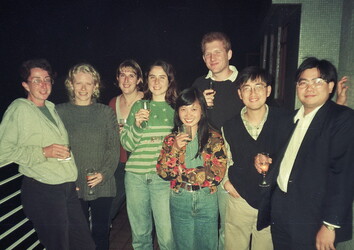 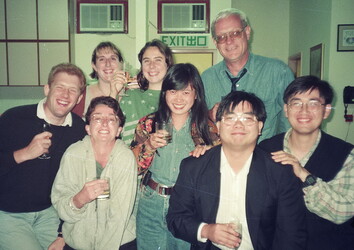 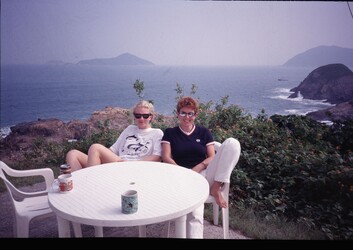 — Dr Lindsay PORTER (Graduated 1998) |
“Dear Brian, you were instrumental in my academic career – I wasn’t planning to study Biology when I enrolled in the BSc at HKU but it was largely Starfish Bay and your infectious love of the local marine environment that converted me to Marine Biology. Over the years, not only did I become a research student of yours, but also, we developed as close friends and colleagues. Regrettably, my move overseas had limited my interaction with you over a period of 20 years. Notwithstanding, I had been a regular follower of your always insightful, mostly firm, and sometimes blunt, editorials on critical issues concerning marine conservation in the Marine Pollution Bulletin. To you, a spade was always a spade – isn’t that what doing Science is about?
Your dedicated effort had contributed so much to the betterment of Hong Kong’s marine environment through your research, the beautiful drawings, capacity building, and influence on policy. Because of your foresight, vision, and unrivalled perseverance and tenacity, Hong Kong has earned a role on the global stage of marine research and conservation. Personally – THANKYOU, Brian, for the trust, friendship, mentoring, and the enduring legacy you have left for Hong Kong and beyond. You were, and will remain to be, a man even your worst critics would remember and respect.
Miss you. Joe Shing Yip Lee — Joe Shing Yip LEE |
In remembrance of Brian Morton Brian sat on WWF’s executive council for 22 years and transferred his passion for marine conservation to everyone he met. Brian was a mentor to more people than I can count. His expertise in marine and freshwater ecology and malacology played an integral role in developing WWF’s wetlands and oceans conservation work. He helped WWF grow from a small volunteer organization into the city’s largest green NGO and laid the groundwork for environmental education programmes that are still running today. In the early days, Brian was helping to raise money for the purchase of gei wai at Mai Po – to protect the flocks of migrating birds that visit each year in spring and autumn – through the Bird Bird Race. In 1987 he established a University of Hong Kong team namely “Birdbrains”. Brian participated in every Big Bird Race event until 2003. In this period, Brian and the Birdbrains raised almost HK$1.4 million for WWF Mai Po conservation and education programmes. Brian’s pioneering work also include in the passing of the Marine Parks Ordinance in 1995 and the declaration of Hoi Ha Wan and other sites as marine parks in 1996. Again, he played an essential role in the founding of WWF Hoi Ha Marine Life Centre. He was an advocator for, and collaborator on, the setting up of WWF Hoi Ha Marine Life Centre. Nowadays, the centre is the important gateway for many students and general public to learn and experience the beauty of Hong Kong marine environment. Brian was firstly invited by Sir David Akers-Jones to set up WWF education committee to lead the development of environmental education since 80s. His vision for educating the new generation of Hong Kong youth was passed on to all the WWF educators that worked with him. Words may fail to sum up the lasting influence that Brian has had on all of us at the panda family, but I am proud to see his legacy in our work every day. Our education programmes go from strength to strength, and our education centres at Mai Po, Island House, and Hoi Ha Wan still bear the recognizable stamp of his input. Thank you, Brian. You will be deeply missed by the panda family! Nicole Wong Acting CEO, WWF Hong Kong 25 June 2021
— Nicole WONG |
We welcome you to share your messages of condolences and photos of Professor Morton with us through email at scialum@hku.hk


